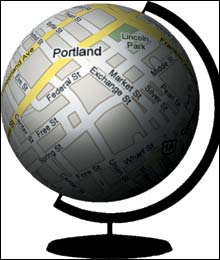
TEN BLOCK WORLD? |
I am a fan of convenience. When I need office supplies, I go to Office Depot, where everything is laid out in navigable, sterile aisles. When I need jeans, I go to the Gap where I can get in and out before the mall makes me dizzy. I rarely plan meals. Hunger usually surprises me empty-handed, sending me into a sandwich shop or a local restaurant with take-out options. I like Wild Oats because I can get hot soup and a hunk of precooked chicken there, no worries.But convenience is not cool. Lately, it seems like everyone in town wears his or her small-scale shopping habits like a badge of honor. A good friend of mine, who grew up in Portland, is a committed localist, meaning she doesn’t own a car and is conscientious about shopping locally, eating local produce, and just generally staying as plugged into her immediate neighbors as she can. The Portland city council has lately suggested that it too favors the local over the from-away, though its plan to ban formula businesses is currently under review. Localism has always been a big thing in Maine (I grew up in Portland, so I suppose I have the authority to say that). Maine is all about independence, this feeling that we’re tucked away in our far northeast corner and we need to protect our unique way of life or else — horror — risk becoming like everyone else. New community groups like “Keep Portland Real†and the Buy Local campaign call on all of us to clasp the uniqueness of this place firmly to our bosoms and bolster it with the almighty dollar. When that fails, some localists then call for a ban all those weirdo outlander chains altogether.
But Portland’s latest trade trend isn’t locally owned. Though international economies meld thanks to the Internet, the World Bank, and multinational chains like Wal-Mart, there is a movement in cloistered corners all over the country to get back to basics. Often our generation leads the pack. In January 2004, MSNBC reported that more 20- and 30-somethings are returning to a “simpler life†outside of big cities than older workers. We’ve been instrumental in launching and sustaining hundreds of buy local campaigns around the country since the late 1990s. And we led the anti-globalization protest in Seattle in 1999.
So I got to thinking. Maybe my convenient life robs me of the best of my community. I already put a good amount of my monthly salary into local businesses, mostly because I like those businesses’ products or they’re close to my home or my workplace. But my mall shopping, however infrequent, might brand me tragically old-fashioned. So I decided to live as locally as possible last week. I vowed to shop local, purchase local products where available, and otherwise use my dollars to connect with the community everyone seems to be voraciously protecting all of a sudden.
Staying in touch with mom, pop
It’s ironic that I grew up here, hence am “local,†and don’t have the same reverence for localism that my out-of-town friends do. I was raised on the West End by my single mother and my grandparents. While my grandparents didn’t drive, my mom loved her car. We drove everywhere. My mom would even sometimes drive me to school, and that was around the corner at Reiche Elementary. Freshman year at Portland High, I wrote a short story about my mother’s car. It was called “Death Volvo†and had to do with the embarrassing amount of rust on the doors. My single teenage act of rebellion was to steal my mother’s car and keep it for a couple of days while I shored up at a friend’s house. By then she had a rust-free Geo Prizm. I took the Prizm and just drove around, out to Fort Williams in Cape Elizabeth and up to Freeport to check out all the stores with Maine’s trendiest clothes. It was relaxing, I could blast music, have out-loud epiphanies, and, best of all, no one bothered me. I loved driving.